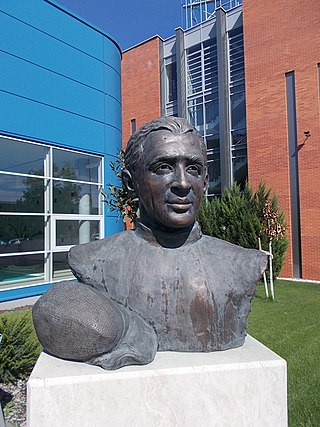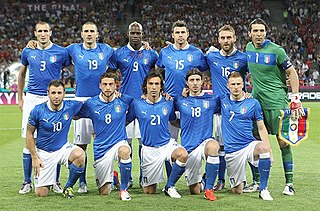
The Italy national football team has represented Italy in men's international football since its first match in 1910. The national team is controlled by the Italian Football Federation (FIGC), the governing body for football in Italy, which is a co-founder and member of UEFA. Italy's home matches are played at various stadiums throughout Italy, and its primary training ground and technical headquarters, Centro Tecnico Federale di Coverciano, is located in Florence.

Giampiero Boniperti was an Italian footballer who played his entire 15-season career at Juventus between 1946 and 1961, winning five Serie A titles and two Coppa Italia titles. He also played for the Italy national team at international level and took part in the 1950 and 1954 FIFA World Cup finals, as well as the 1952 Summer Olympics with Italy. After retirement from professional football, Boniperti was a CEO and chairman of Juventus and, later, a deputy to the European Parliament.

Gianluigi "Gigi" Buffon is an Italian former professional footballer who played as a goalkeeper. Widely regarded as one of the greatest goalkeepers of all time, and by some the greatest of all time, he is one of the few recorded players to have made over 1,100 professional career appearances and holds the record for the most appearances in Serie A.

Gianpiero Combi was an Italian footballer who played as a goalkeeper. He spent his entire club career at Juventus, where he won five Italian League titles. At international level, he won the 1934 World Cup with the Italy national team, as well as two Central European International Cups, and an Olympic bronze medal in 1928.

Italy competed at the 1964 Summer Olympics in Tokyo, Japan. 168 competitors, 157 men and 11 women, took part in 91 events in 18 sports.

Italy competed at the 1968 Summer Olympics in Mexico City, Mexico. 167 competitors, 152 men and 15 women, took part in 103 events in 17 sports.

Italy was the host nation for the 1960 Summer Olympics in Rome. It was the first time that the nation had hosted the Summer Games, and the second time overall. It also hosted the 1960 Summer Paralympics in Rome – the inaugural Paralympic Games.

The men's épée was one of eight fencing events on the fencing at the 1964 Summer Olympics programme. It was the fourteenth appearance of the event. The competition was held from October 18 to 19 1964. 65 fencers from 25 nations competed. Each nation was limited to three fencers. The event was won by Grigory Kriss of the Soviet Union, the nation's first gold medal in the event after a bronze four years earlier. The Soviets also took bronze, with Guram Kostava finishing in third place. Between the two was silver medalist Bill Hoskyns of Great Britain; it was the second consecutive Games with a British silver medalist in the event. Italy's six-Games gold medal streak in the men's individual épée ended with the nation missing the podium entirely; Gianluigi Saccaro finished fourth after losing the bronze-medal barrage to Kostava.
This page details football records and statistics in Italy.
For the 1960 Summer Olympics, a total of thirty-four sports venues were used. The Basilica of Maxentius, the Baths of Caracalla, the Appian Way, and Via Cassia were among the ancient Roman venues used for the games. The football stadium in Florence hosted the 1934 FIFA World Cup and would later host the 1990 FIFA World Cup. Stadio Olimpico would later serve host to the 1987 IAAF World Championships in Athletics and the final venue for the 1990 FIFA World Cup. The marathon would be lit at night by Italian soldiers holding torches that included the Appian Way with a finish at the Arch of Constantine.

The men's épée was one of eight fencing events on the fencing at the 1968 Summer Olympics programme. It was the fifteenth appearance of the event. The competition was held from 21 to 22 October 1968. 72 fencers from 28 nations competed. Each nation was limited to three fencers. The event was won by Győző Kulcsár of Hungary, the nation's first medal in the men's individual épée. Defending gold medalist Grigory Kriss of the Soviet Union took silver, becoming the eighth man to win multiple medals in the event and extending the Soviet podium streak to three Games. Italy returned to the podium as well after a one-Games absence broke its six-Games gold medal streak, with Gianluigi Saccaro earning bronze.

The men's épée was one of eight fencing events on the fencing at the 1972 Summer Olympics programme. It was the sixteenth appearance of the event. The competition was held from 4 to 6 September 1972. 71 fencers from 28 nations competed. Each nation was limited to three fencers. The event was won by Csaba Fenyvesi of Hungary, the nation's second consecutive victory in the event. His countryman Győző Kulcsár, the 1968 gold medalist, earned bronze this time to become the ninth man to win multiple medals in the men's individual épée. Silver went to Jacques Ladègaillerie of France; the French épéeists, a power in the event from 1900 to 1932, earned their first individual medal in 40 years. The three-Games podium streak of the Soviet Union was snapped, with all three Soviet fencers reaching the semifinals but eliminated there.

Gabriel Vasconcelos Ferreira, mononymously known as Gabriel, is a Brazilian professional footballer who plays as a goalkeeper for Juventude, on loan from Coritiba.

Gianluigi Donnarumma is an Italian professional footballer who plays as a goalkeeper for Ligue 1 club Paris Saint-Germain and captains the Italy national team.

This article lists various football records and statistics of the Italy national football team.











